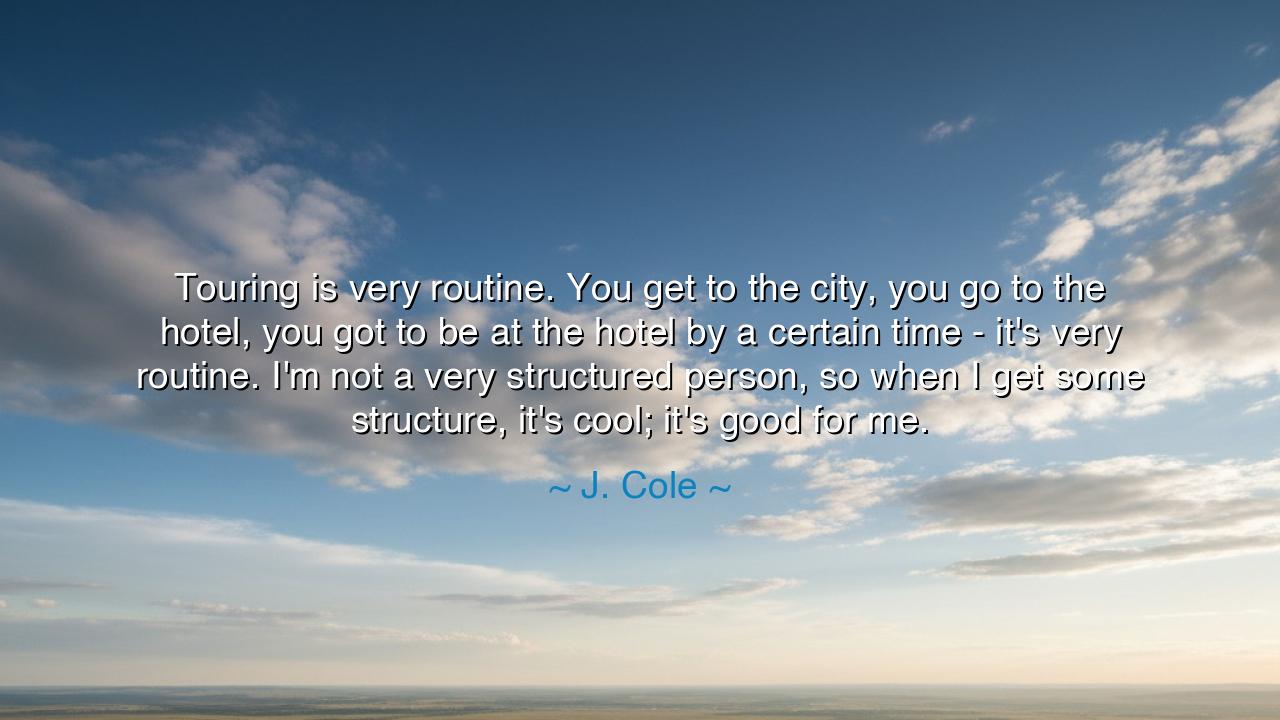
Touring is very routine. You get to the city, you go to the
Touring is very routine. You get to the city, you go to the hotel, you got to be at the hotel by a certain time - it's very routine. I'm not a very structured person, so when I get some structure, it's cool; it's good for me.






The words of J. Cole—“Touring is very routine. You get to the city, you go to the hotel, you got to be at the hotel by a certain time—it's very routine. I'm not a very structured person, so when I get some structure, it's cool; it's good for me.”—carry the quiet wisdom of a man who has walked through the chaos of creativity and discovered the hidden strength of discipline. In this reflection, the artist speaks not merely of travel or performance, but of the eternal dance between freedom and order, between the wild spirit that seeks to wander and the guiding rhythm that brings it home. It is a confession born from experience, an understanding that even the freest soul must sometimes submit to structure if it is to grow, endure, and find peace.
Cole’s words come from the life of a traveler—a musician who journeys from city to city, stage to stage, bearing the fire of his art to the world. To many, such a life seems boundless and glorious, filled with spontaneity and adventure. Yet he reveals the deeper truth: that the life of an artist, for all its freedom, can dissolve into disorder without the anchor of rhythm. The road, though alive with sound and movement, can easily blur into sameness, leaving the mind restless and the soul untethered. Thus, Cole finds an unexpected gift in routine, that ancient medicine for the wandering heart.
This revelation echoes through history. The ancients, too, knew that unbounded freedom without form becomes chaos. The warrior-philosopher Marcus Aurelius rose each dawn to meditate upon his duties as emperor, binding his restless thoughts to ritual so that he might rule wisely. The samurai of Japan trained endlessly in their forms, finding calm in repetition. Even the monks of old, who sought divine freedom, lived by the bell’s call—its steady toll dividing their days into moments of labor, prayer, and reflection. They understood what Cole now speaks: that structure is not the enemy of the spirit but its silent ally, shaping chaos into creation and passion into purpose.
When J. Cole says, “I’m not a very structured person, so when I get some structure, it’s cool; it’s good for me,” he is voicing the humility of the wise. For the greatest artists, though they create from feeling and fire, know that inspiration alone is not enough. Without discipline, the flame burns too quickly and dies. Structure becomes the vessel that holds the fire, allowing it to shine without consuming itself. Touring, for him, becomes not just a schedule but a teacher, reminding him that even the unstructured heart can find strength in rhythm and balance in the ordinary.
It is tempting for those who dream—to believe that freedom means living without rules, that greatness is born only from chaos. Yet the opposite is true. Every poet must master the meter before he breaks it; every painter must understand form before he transcends it; every musician must know time before he can bend it. Routine does not kill creativity—it tempers it. Just as the river finds its power by following its course, so too does the human spirit gain momentum when it learns to flow within its own bounds.
The lesson here is both simple and eternal: embrace structure as a friend, not a foe. Do not fear the routine that seems dull or repetitive, for within it lies the soil of growth. Whether you are an artist, a student, or a dreamer, remember that progress is not built on fleeting bursts of inspiration, but on steady effort repeated day after day. The routine that once feels confining will, in time, become a rhythm that frees you—because in mastering structure, you master yourself.
Therefore, let J. Cole’s reflection guide all who wander in search of purpose: learn to find beauty in the mundane, peace in repetition, and freedom in order. Do your work faithfully, rise and rest by the discipline of your craft, and let structure hold your dreams the way the sky holds the stars. For as the ancients and the artists have always known, the man who governs his habits governs his destiny. Structure is not the prison of the spirit—it is the bridge that leads it to greatness.






AAdministratorAdministrator
Welcome, honored guests. Please leave a comment, we will respond soon